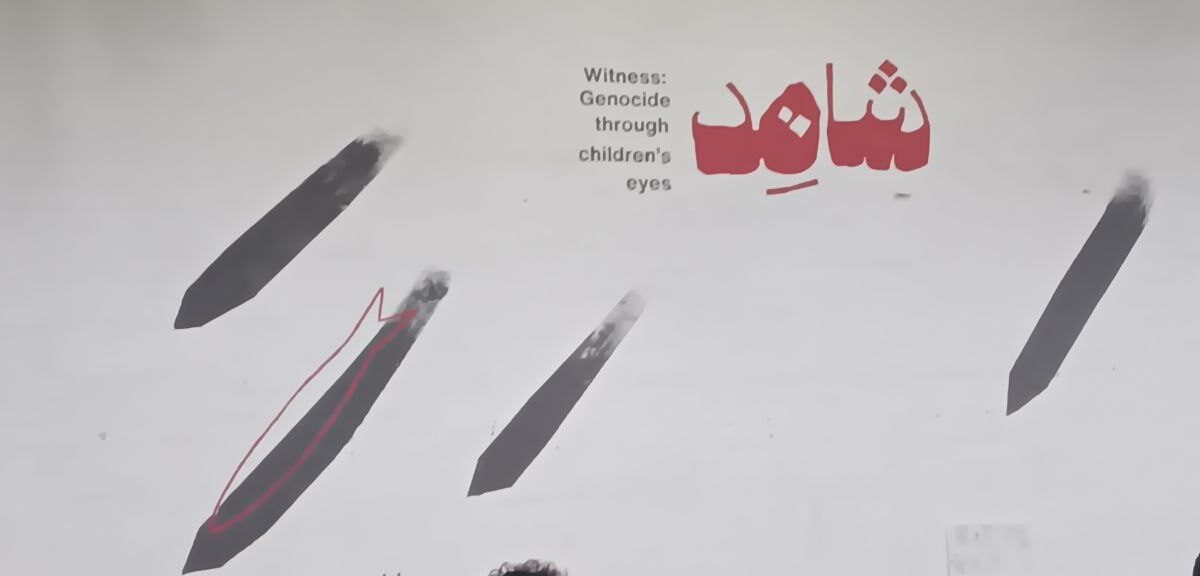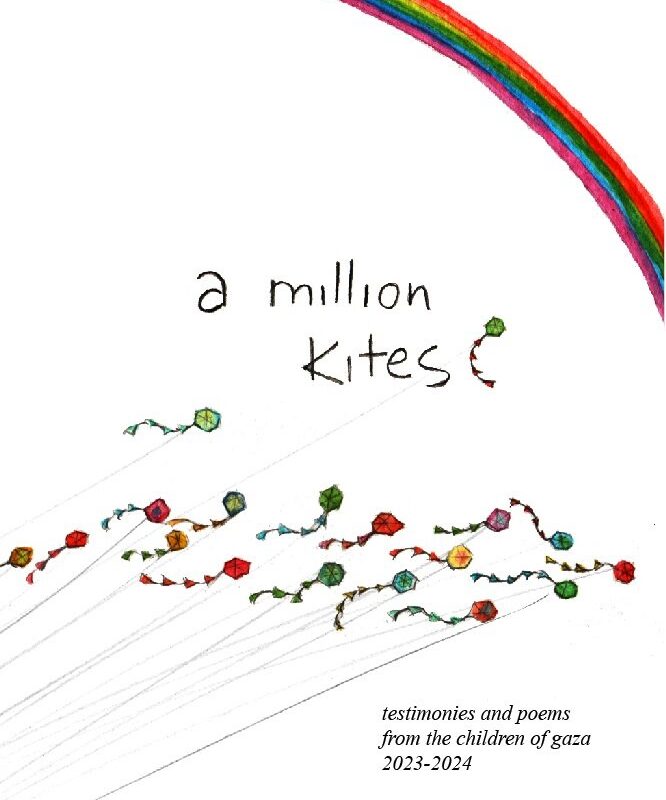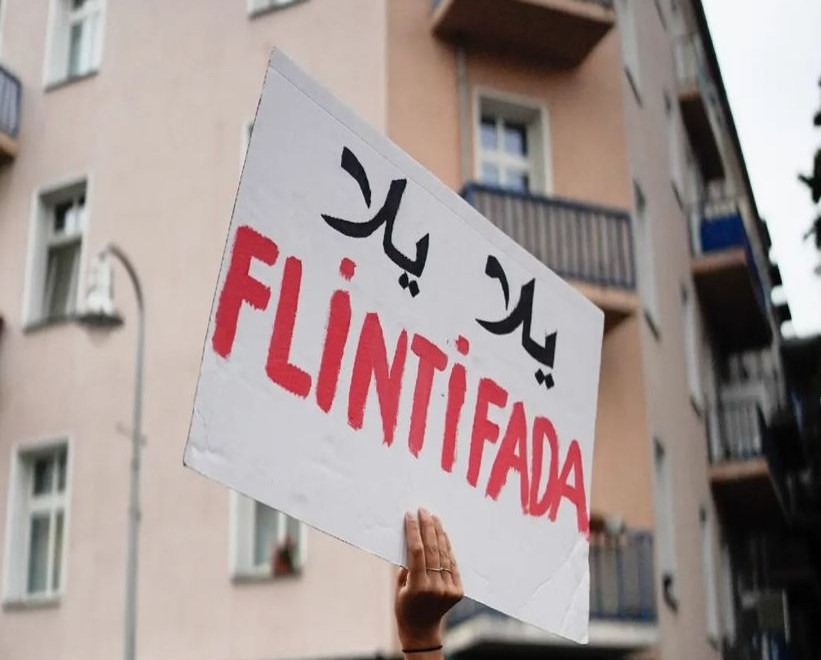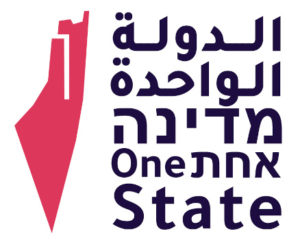Thanks for talking to us. Could you start by briefly introducing yourself?
My name is Awni Farhat. I’m the founder and director of the PHRC, the Palestine Humanitarian Response Centre. It’s a nonprofit organization. We work in Gaza, mainly on issues around children with trauma. We have a team of experts in different areas, and our focus is on trauma relief.
In Gaza, during the beginning of this genocide, we built a Children’s Village in Rafah. And every day we had more than 250 children come and join our activities. We have different corners, we have theatre, we have a music corner, we have different small games, we have music, we have different spaces where children can get a sense of childhood again. Because what’s happening now in Gaza takes their childhood away.
It’s just very, very horrific that a lot of people don’t even have spaces to be with their own children. We have created a space where children can be reminded of their own childhood.
And you had to move the space from the original venue?
Since May, after the ground invasion, everyone has relocated, and were forcibly moved from Rafah to other places. Rafah now is a ghost town. Families, children, team members – everyone has evacuated from Rafah.
We now have two locations. At the same time we are building a big location on the beach. The beach has a very strong connection with Palestinians. It’s the only open space. In Gaza, everything’s landlocked. There are no spaces for breathing. But the beach is the main space for Palestinians to connect with the outside world.
Also for trauma relief and trauma therapy, being close to the beach plays a huge role in dealing with the situation, and creates a space for hope and light. It’s really important, especially at this time when children develop their understanding of the world. If everything around them is dark, they’re going to develop a very dark understanding of the world.
We’re trying to change this. We’re trying to plant seeds of hope and lightness in these dark times.
Do you think that the bombing affects children in a specific way differently to adults?
Children are very resilient. It depends more on where you are and how old you are. The aware children are affected more – those who are 14, 15, 16 get impacted the most. Those who are 5, 6, or 7 are still developing their conscious and understanding of the world. If they are not treated, they’re going to develop mental disorders forever. And then there are the ones in the middle who are very resilient and very, very smart – they need care. I think it’s important to provide care and love.
But Palestinian children are very resilient. If you grow up in a situation like this, you build a ceiling which is quite high compared to another child who is outside this situation.
It affects them deeply. And the drawings in this exhibition are the living proof that we have today. Children should not be drawing tanks and dead bodies and rocks. They should be drawing rainbows and flowers and happy faces and not this.
Let’s talk about the drawings. We’re here at Witness, an exhibition of drawings from children in Gaza. It was in Amsterdam, it’s now being shown in Berlin. Can you tell me a bit about the idea behind the exhibition?
This exhibition features artwork made by children. And we wanted to bring the original drawings for people to come and see them. You don’t have access to what’s happening in Gaza. You don’t have access to what’s happening in Palestine. You see it from behind your phone and everything is peaceful.
We are breaking the censorship, and bringing physical proof to people to come close to it. You’re standing in front of an A4 picture which was drawn by a child. You don’t have access to this visible proof because everything is monitored, everything is censored.
So we are trying to break these boundaries and come close to people. People can witness it, people can see it, people can look at it, people can relate to it, because a lot of people would have children, they have siblings, they have young people in their life, and this can be anyone in their own family.
What has been the reaction of people so far to the exhibition?
It’s important. Everyone reacts differently. It’s quite shocking for most people to see that children can draw things like this. At the same time, it’s very different. They are not used to saying things like this. It’s quite shocking because they never even know what a tank looks like, what a rocket or a bullet looks like. Children in Gaza do, because this is the reality they have around them. It looks like this.
For me, children are the most pure, honest people in the world. They can communicate their feelings and emotions much easier than speaking. They can put it on paper. It’s my responsibility to bring this message to the people who don’t see.
I went to Gaza. I was there during November. Now no one can get in and no one can get out because they’ve closed the Rafah crossing. It’s completely detached from the entire world. Unfortunately, Palestinian people don’t have freedom. They can’t freely travel, and they can’t bring their voices to people outside.
These drawings are screaming out in this exhibition area to show the reality of what’s happening in Gaza. These are the voices of these children. I wish everyone can come and see it.
How would you like people to react? They come, they see the drawings, they see the films you’re showing. What should they do?
It’s a call for action. You can’t control how people react. You can’t control how they will feel. But the main objective is a call of action. I hope that people leave this exhibition and feel responsible. They are a witness who can do something about it.
We can do so much here. We have so much privilege. Unfortunately, of course, in Germany you live under a very difficult political reality. But there’s still hope for change. And we need to change the political reality. We need to change the system. Because what’s happening outside the border of Europe is going to impact the policies and the core cause of our political stand.
Do you see that art has a role in changing realities?
Yeah, definitely. Art is art. It is the window that artists, or creatives, can use to connect with people through a community understanding of taking action. And now we’re using this as a tool to connect and let people come close.
These pictures have been drawn by kids in Gaza. Have you talked to the kids afterwards? How are they now?
Unfortunately, after the Rafah invasion, we lost contact with most of the children, because they have relocated. Some of them are still in Khan Younis and other areas. A lot of families are following us on social media. So we are in touch with some of them, we have their phone numbers and contact details. Some of them are also following the exhibition.
We are trying to keep in touch, but people are evacuating every day to survive. And it’s very difficult to maintain the connection. But we know the faces, we have the names, we have the contacts.
And if somebody is interested in putting on the exhibition somewhere else, what should they do? Who should they contact?
They can contact me at awnifarhat@hotmail.com. They can contact us on the website or Instagram. We did the exhibition in La Hague, we did it in Amsterdam. This is the third time. Hopefully, we will have a good experience in Berlin. I was quite skeptical at the beginning, given the situation here.
Is there anything else that you’d like to say?
I wish more people come and see this exhibition, more people who don’t have any relationship with Palestine, or what’s happening. I wish more parents come and see it. I wish people who don’t have this exposure to come and get exposed. I don’t want to convince them, I don’t want to talk to them, I just want to see.
That’s the main thing. Because we are creating space and access. The exhibition’s name is Witness. And I think it’s important that if you have access to exposure, you can’t unsee it again. That’s the main thing. As humans, you have responsibilities to live your life with due responsibility. You create a life where everyone is equal, not as someone having power over your rights.
These children, they don’t have rights, because others decided to take these rights away.
What do you think people can do to help the children?
First, given where we are now, I think we need to push a lot to change things in politics. We need to change how people perceive Palestinians. We need to humanize Palestinians again. There has been a long, long, long history of propaganda and brainwashing creating a narrative which is only based on one side. We need to change this now.
I am here as a Palestinian man, as a human, and I think it’s quite scary sometimes just to walk around and wear the kuffiyah. This is only because there’s a huge propaganda happening against what’s happening in Palestine. I wish we can change this. I want people to be the voice. This can be any of their family members. We need to act as a collective to protect these children.




